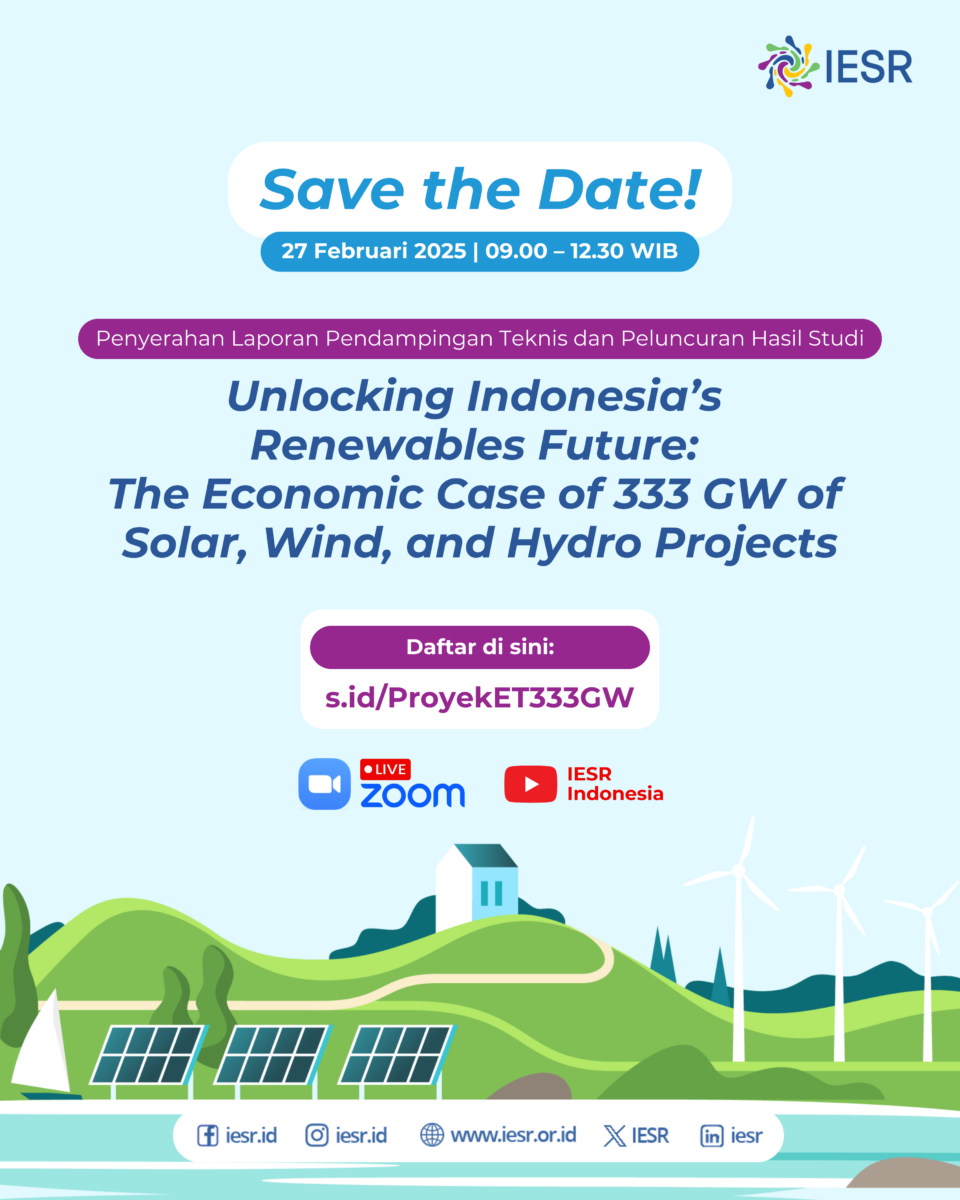
Pre-Feasibility Study (Pre-FS) Presentation & Launch of Study Results Unlocking Indonesia’s Renewable Energy Future: The Economic Case for 333 GW of Solar, Wind, and Hydropower Projects
Background
In the Enhanced Nationally Determined Contribution (ENDC) report, the Indonesian government targets in 2030, emission reduction in the energy sector to reach 358 million tons CO2eq by its own efforts (CM1). In line with this goal, the Indonesian government is also committed to achieving Net-Zero Emission in the energy sector by 2060 or sooner. However, the utilization of renewable energy in the national energy mix until Semester 1 2024 has only reached 13.93%. Referring to the National Energy General Plan (RUEN) which targets the use of renewable energy in the national energy mix of 23% by 2025, the government has a lot of work to do to catch up with the renewable energy utilization target, around 9%, in less than a year.
To assist the government in meeting the target of renewable energy utilization in the national energy mix, IESR through a technical assistance program has conducted a Pre-Feasibility Study (Pre-FS) for solar power plants (PLTS), wind power plants (PLTB), and pumped hydro energy storage (PHES). The study was conducted in locations that have potential beyond the potential or plans mentioned in the RUPTL or the CIPP-JETP report. The results of the study show that there is a potential of around 177 MWp of Floating Solar Power Plant in South Kalimantan Province, and Wind Power Plant and PHES with a capacity of around 100 MW each in South Sulawesi Province.
In addition, in conjunction with the implementation of technical assistance, IESR has also conducted a study related to the technical potential and economic feasibility of ground-mounted solar power plants, wind power plants, and mini hydro power plants on a utility scale for all areas in Indonesia (called the Unlocking Indonesia’s Renewables Future: the Economic Case of 333 GW of Solar, Wind, and Hydro Projects). In this study, the identification and determination of the technical potential of each renewable energy technology is carried out through spatial analysis covering all areas in Indonesia, taking into account several constraints, such as the potential of renewable energy sources (solar irradiation, wind speed, and river flow), land availability, land price, distance to the nearest connection point, and others. Furthermore, the technical potential resulting from spatial analysis is tested for its economic feasibility through financial modeling (project financing structure). In this study, a renewable energy project is said to be economically feasible if the financial modeling results show an equity internal rate of return (EIRR) value higher than the weighted average cost of capital (WACC), which is assumed to be 6.96%. The study results show that there are a total of 333 GW of renewable energy projects, consisting of 165.9 GW of ground-mounted solar power plants, 167 GW of wind power plants, and 0.7 GW of thermal power plants, which are economically viable and spread throughout Indonesia.
The results of the Pre-FS study and Unlocking Indonesia’s Renewables Future: the Economic Case of 333 GW of Solar, Wind, and Hydro Projects are expected to be an input for the Indonesian government and relevant stakeholders in preparing a list of new projects that can be implemented in the near future and help identify risks, especially from the technical and economic aspects, of renewable energy project investments in various regions in Indonesia. Therefore, IESR will organize an event to submit the results of the Pre-FS study and disseminate the results of the Unlocking Indonesia’s Renewables Future: the Economic Case of 333 GW of Solar, Wind, and Hydro Projects study.
Objective
This event was organized with the following objectives:
- Dissemination and handover of the results of the Pre-FS study on Solar PV, Wind, and Energy Storage to the Directorate General of New and Renewable Energy and Energy Conservation, Ministry of Energy and Mineral Resources (EBTKE-KESDM).
- Dissemination of the study Unlocking Indonesia’s Renewables Future: the Economic Case of 333 GW of Solar, Wind, and Hydro Projects.
- Obtain input and responses from relevant policy makers on the results of the Unlocking Indonesia’s Renewables Future: the Economic Case of 333 GW of Solar, Wind, and Hydro Projects study.
Speakers
-
Fabby Tumiwa - Direktur Eksekutif IESR
-
Nizhar Marizi ST M.Si Ph.D. - Director of Mineral Energy and Mining Resources - Bappenas
-
His Muhammad Bintang - Power and Energy Resources Coordinator - IESR
-
Evy Haryadi - Direktur Transmisi dan Perencanaan Sistem PLN
-
Prof. Dr. Eng. Eniya Listiani Dewi - Direktur Jenderal Energi Baru Terbarukan dan Konservasi Energi - Kementerian Energi dan Sumber Daya Mineral
-
Dwi Cahya Agung Saputra - Power System Transition Coordinator - IESR
-
Pintoko Aji - Data and Modeling Group Research Coordinator - IESR
-
Sodi Zakiy Muwafiq - Geographic Information System Analyst - IESR
-
Imron Gazali - Direktur & Chief Operating Officer - PT Medco Power Indonesia
-
Faaris Pranawa - Public Fiancing & Project Development Director of PT Sarana Multin Infrastuktur

